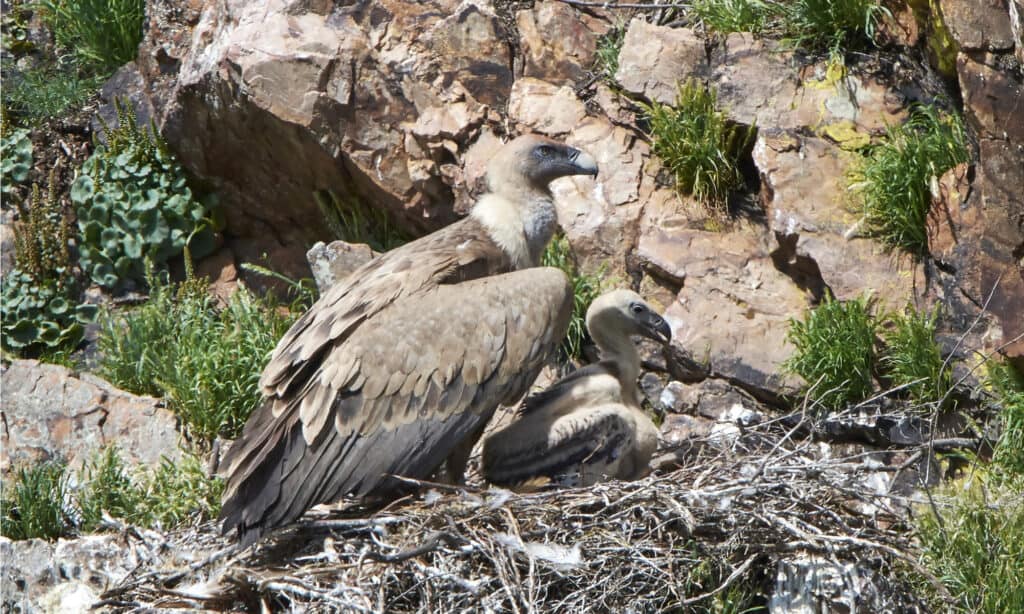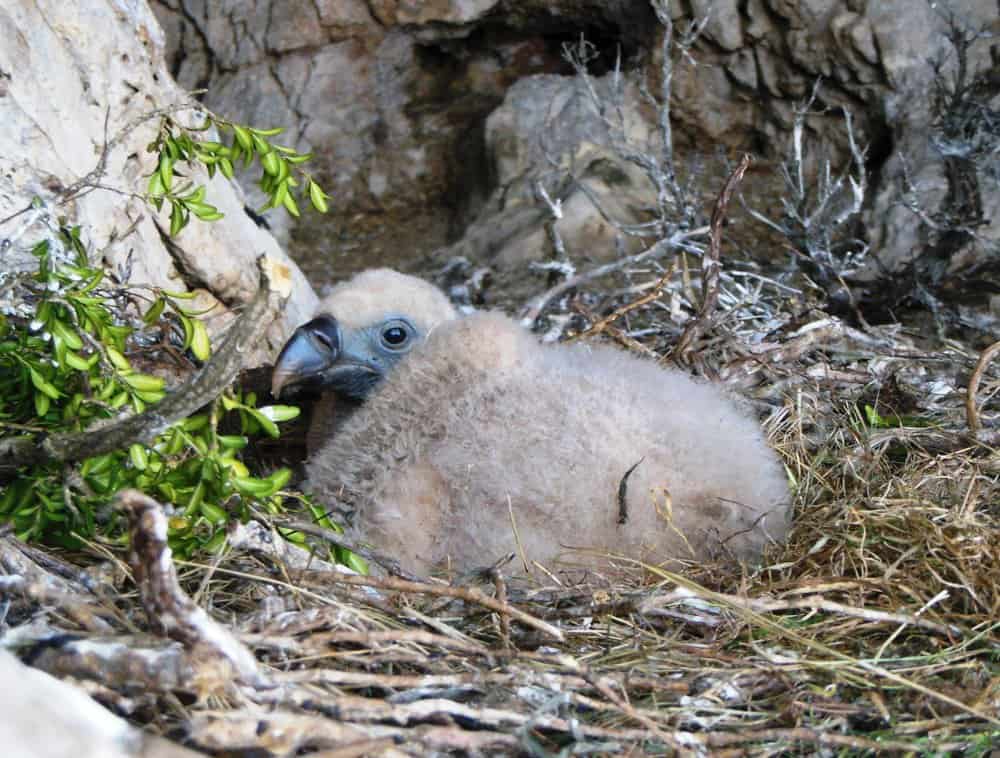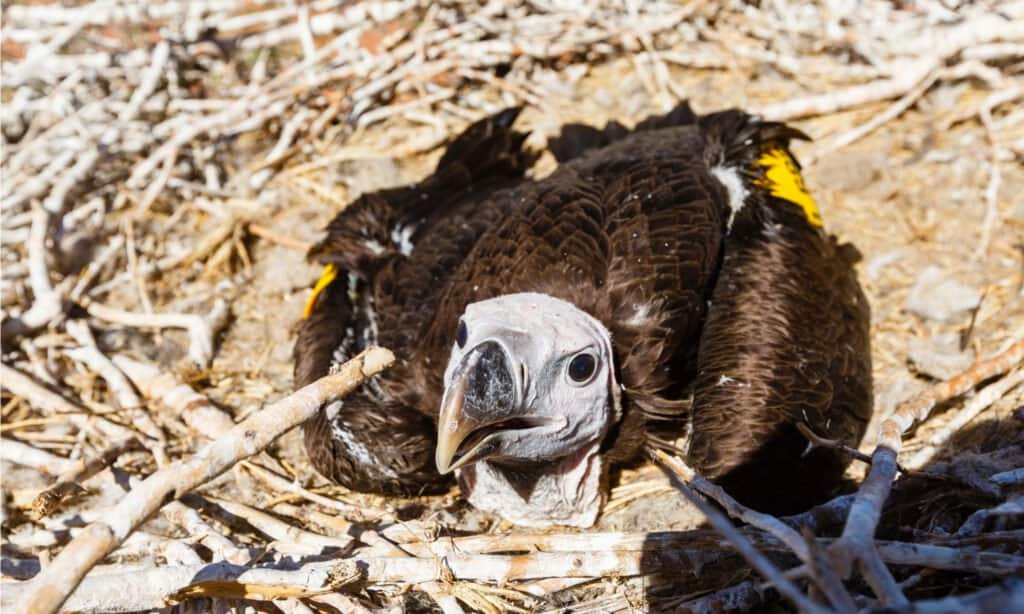Vultures are among the most iconic birds in the animal kingdom. From turkey vultures to the classic black vulture, these carrion birds are an essential part of their ecosystems. There are 23 species of vultures in two groups: Old World and New World vultures. Though they gain a fearsome reputation as adults, baby vultures are just as vulnerable and needy as any other young animal. Read on to discover eight fascinating facts about baby vultures!
1. Baby Vultures Vomit on Attackers

Some New World vultures vomit on nearby animals when they feel threatened.
©Dennis Jacobsen/Shutterstock.com
Vultures have a reputation for crassness, and no wonder. Not only do they eat decaying bodies, but some New World vultures, like turkey vultures, vomit on nearby animals when they feel threatened. Even inexperienced vulture chicks have this trick in their arsenal.
Experts disagree on the reason vultures vomit on attackers. Some maintain that it’s a defensive mechanism similar to a missile launch in function. Others insist that vultures simply vomit to lighten their bodily load and facilitate a quicker takeoff. Whatever the reason, it’s an effective adaptation in the face of potential threats. For this reason, anyone attempting to handle a supposedly defenseless vulture chick should take care not to startle it.
2. Vulture Parents Hide Their Babies From the World
If you’ve ever tried to take a peek into a vulture’s nest, you’ll know it’s not easy. Vulture parents are almost paranoid about keeping their young safe and out of view. Even expert ornithologists have a difficult time tracking down a vulture nest for their studies. Particularly elusive are turkey vultures, which nest in such unlikely locations as abandoned structures, deep in rotting tree trunks, and behind groups of boulders.
3. Baby Vultures Eat Regurgitated Food

Baby vultures eat the same diet as their parents, but in regurgitated form.
©JITD/Shutterstock.com
Baby vultures can’t go out and hunt for themselves and rely entirely on their parents to bring them food. However, many vulture species have weak legs with blunt talons, making it difficult to bring food back to the nest. Moreover, it may be hard for very young chicks to feed on what they bring back. So vulture parents regurgitate the food they’ve already eaten into the mouths of their chicks.
How do vultures manage this? Like many other birds, vultures have a crop, which is a muscular pouch at the front of their necks. This pouch holds food the vulture has consumed. Later, the vulture is able to stimulate the crop and regurgitate its contents. The crop can store food for up to 12 hours.
Though it may seem counterintuitive, baby vultures eat the same diet as their parents, which means they also consume carrion. In some species, this regurgitated food takes the form of pre-digested liquid. This makes vultures a vital part of the ecosystem, helping to remove decaying matter from the landscape.
4. Both Parents Raise Vulture Chick
There’s a sharp differentiation between the sexes of most species in the animal kingdom, including who takes care of the young. In most cases, the female carries most or all of the burden of childcare. In the case of most vulture species, however, both males and females have a part to play in raising vulture chicks. Despite their reputation and looks, vultures make caring and attentive parents.
Not only that, but vultures have a limited number of chicks at once, usually no more than three or four. Sometimes a vulture chick will be the only one in the nest, receiving the full benefit of both parents’ care. On top of this, most vulture species are monogamous.
5. Vulture Chicks Take as Long as 8 Years to Sexually Mature
Vulture chicks are typically able to fly by 75-80 days of age, but sexual maturity and mating take a lot longer. While some species, like the turkey vulture, sexually mature by the age of four to five years, other species, like the bearded vulture, may take as long as eight years to reach the point where they can mate.
Vultures initiate mating with a midair chase. The male pursues the female through the air, flapping, and diving as they fly. On the ground, some species of vultures hop in a circle with their wings spread in a kind of mating dance.
6. Some Vulture Chicks Hatch on Different Days

In some vulture species, the chicks hatch on different days.
©Markus Oblaender/Shutterstock.com
In some vulture species, like the black vulture, the chicks hatch on different days. This means that chicks may differ in size, leading to aggression and dominance from the larger individuals. The chicks that hatch earlier will also reach milestones earlier. These milestones include fledging (acquiring their first feathers), taking their first steps, and attempting their first flight.
7. Some Vulture Chicks Are Born Bald
Some vulture species, like the American king vulture and the turkey vulture, sport definitive bald heads. Though not all vultures are bald (the bearded vulture, for example, has a feathered head), those that look that way from birth. The fact that vulture chicks lack down or feathering on their heads may seem to be a disadvantage. After all, don’t they have to keep warm?
Scientists believe there are a couple of reasons why vultures are born bald. The first reason has to do with their eating habits. When picking flesh off a carcass, vultures often stick their entire heads inside to get at the decaying internal organs. This obviously is a dirty process, especially if feathers are present. Some vultures may have developed baldness to avoid making a mess of their heads.
The other reason has even more credibility. Many vultures live in hot climates where the ability to cool off is crucial. Their bald heads and necks allow them to shed heat at the hottest parts of the day. When it cools off, or they ascend to higher altitudes, they can tuck their heads into their wings to keep warm.
8. Baby Vultures Are Blind at Birth
Baby vultures are born blind and completely dependent on their parents. It takes several weeks for vulture chicks to gain enough independence to move around on their own. Ironically, after they mature, most vulture species have keen eyesight. This, coupled with an incredible sense of smell, helps them locate decaying animal corpses. The turkey vulture can smell carrion from over a mile away, giving them a more powerful olfactory system than any other bird on earth.
Vultures may appear repulsive, but they are an irreplaceable part of the natural world, helping clean up dead and decaying matter.
Up Next:
- Why Do Vultures Circle?
- 10 Incredible Vulture Facts
- The Top 10 Largest Vultures in the World
- Meet the 7 New World Vulture Species
The photo featured at the top of this post is © Markus Oblaender/Shutterstock.com
Thank you for reading! Have some feedback for us? Contact the AZ Animals editorial team.






